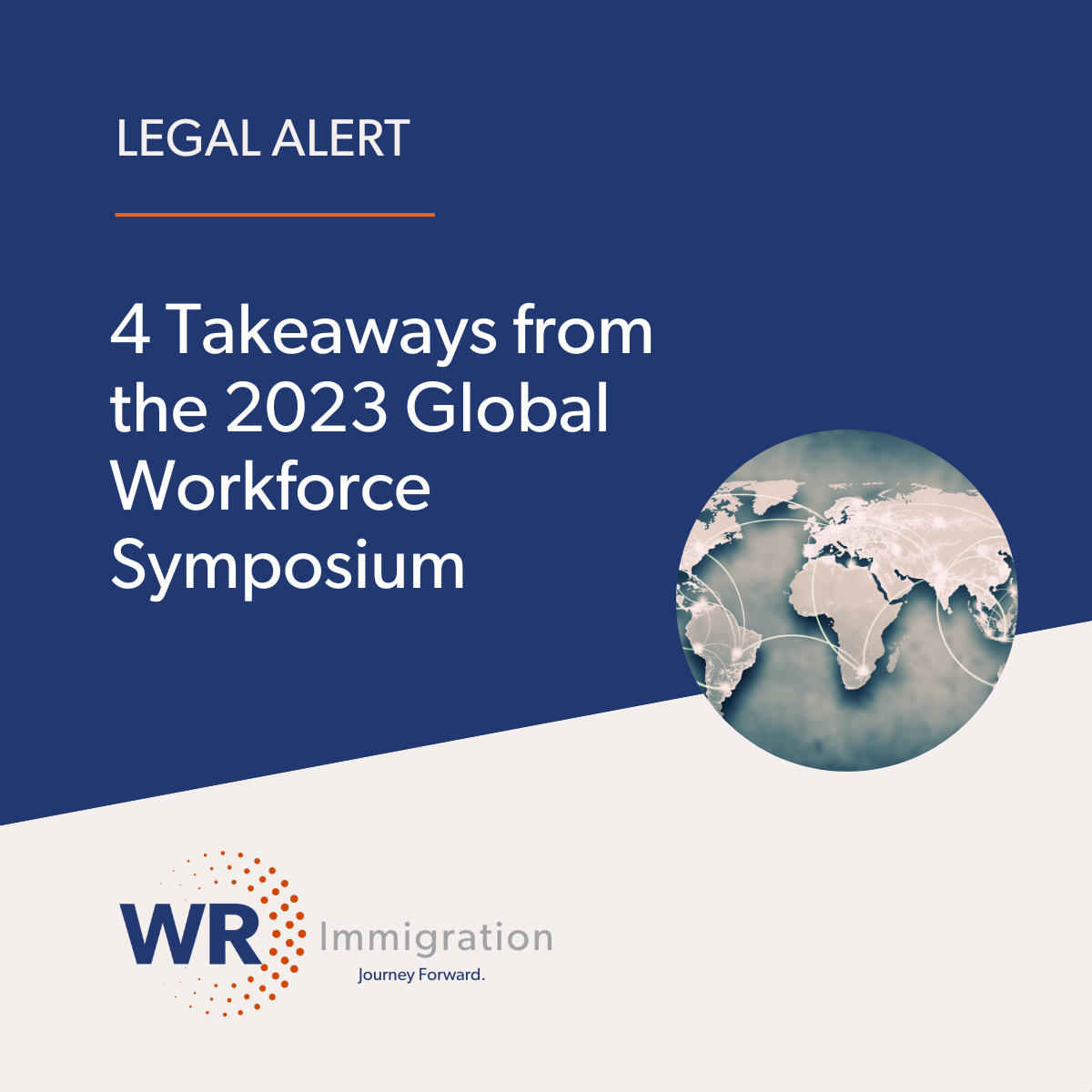WR Immigration was proud to sponsor the Worldwide ERC 2023 Global Workforce Symposium held in Boston this year. While at this annual meeting of global mobility professionals, we had a chance to meet with old friends and colleagues, as well as create new connections with whom to share insights on how to bring global mobility practices to the next level. If you couldn’t make the conference—or if you did attend but were overwhelmed by the sheer number of panels from which to choose—we’ve compiled a list of the hottest topics from this year’s symposium. Below, we’ve listed the topics that came up again and again in panels, keynotes, and conversations, plus ideas on what these trends might mean for the global mobility industry as we head into 2024.
1. Resistance is Futile: AI is Taking Over
There was no escaping AI at this year’s GWS. In addition to the three panels on AI-related topics listed in the official schedule, there were a slew of new vendors in the exhibit hall offering AI-enhanced solutions to global mobility challenges, and discussion of how AI will transform global mobility seemed to be on everyone’s lips. AI was touted as a means of containing administrative costs, streamlining global mobility and immigration processes, and even a route to optimizing talent attraction and retention. AI solutions can be tailored for not only the practice of immigration law, but also to suit employer sponsorship of foreign national employees. For example, WR Immigration’s assessment and document processing bots: WRay and WRosie, review candidates, flag potential immigration issues and risks, read government notices, passports, and visas, and provide instant updates to ensure accurate record keeping and candidate notifications.
As we look to the future of AI, challenges with AI data storage, security, transparency, and privacy are among the many potential challenges for employers to wrestle with in years ahead. Additionally, attendees discussed possible uses for different forms of AI (generative AI, machine learning, and computer vision) in immigration law and what their potential effects may be on future global mobility and corporate immigration programs.
2. DEI-ing the Impossible: How DEI and ESG Needs Are Pushing Organizational Change
GWS panels this year underscored the fact that Diversity, Equity, and Inclusion (DEI) and Environmental, Social, and Governance (ESG) considerations have become standard benchmarks for evaluating companies in today’s competitive landscape. Whether organizations are competing for talent, clients, or vendor contracts, it is no longer possible to neglect these vital aspects of company values if they want to remain competitive. This influence on global mobility is more than just theory, as clients are placing heightened emphasis on the specifics of how DEI and ESG values are being incorporated into their day-to-day operations of the organizations they engage with. Procurement inquiries regularly delve into the specifics of carbon footprint, emissions, workforce composition, and other DEI and ESG values. In order to remain competitive, several panels and discussions centered on how to use these concerns to encourage more sustainable and equitable practices within organizations.
3. Help Wanted: Attracting Global Talent by Thinking Outside of the Box
Recent studies suggest that most companies anticipate facing a skill shortage within the next 3-5 years. Several GWS panels discussed the ways in which attracting and retaining global talent has become increasingly challenging as the workforce continues to evolve skilled foreign nationals represent a significant source of valuable talent, but governmental processing delays and outdated legislation impede their entry into the workforce. A one-size-fits-all approach to attracting and retaining talent is no longer sufficient, particularly in cases where organizations are competing for top talent. Forward-thinking companies are now distinguishing themselves in the labor market by offering customized benefits packages tailored to the needs of individual candidates. These packages extend beyond the traditional offerings and include services that address specific needs, such as remote work opportunities, self-initiated moves, immigration and visa solutions, locating suitable schools and activities for children, facilitating pet relocation, and supporting spousal employment and visa opportunities. Benefits packages are adapted to fit the stage of life and priorities of different candidates and seek to elevate the overall employee experience.
4. Visa Bulletin Predictions from Charlie Oppenheim
Charlie Oppenheim, former Chief of the Visa Control and Reporting Division at the U.S. Department of State, and current Director of Visa Consulting at WR Immigration, offered insight into what global mobility professionals can expect from the visa bulletins in the coming year. Stressing the unfortunate reality that only Congress has the power to act to change the immigration system, Charlie offered several solutions for professionals trying to help their employees navigate the immigration process. He also suggested ways in which professionals can plan strategically for their future workforce needs and likely immigration challenges.
One strategy for employers to consider is initiating green card sponsorships earlier in an employee’s tenure. This will get the process into the pipeline more quickly and reduce overall waiting time as a result. Employers should consider budgeting issues that may occur by an increased number of H-1B extensions for employees and their dependents.
At WR Immigration, we understand the importance of staying at the forefront of global mobility trends and innovation. Our attorneys are ready to discuss how we can assist you in strategizing and navigating the complex world of immigration law as it relates to global mobility. Contact us today to learn about our immigration solutions that prioritize compliance, efficiency, and effectiveness – crafted specifically to secure top foreign talent and drive success in your global workforce.


